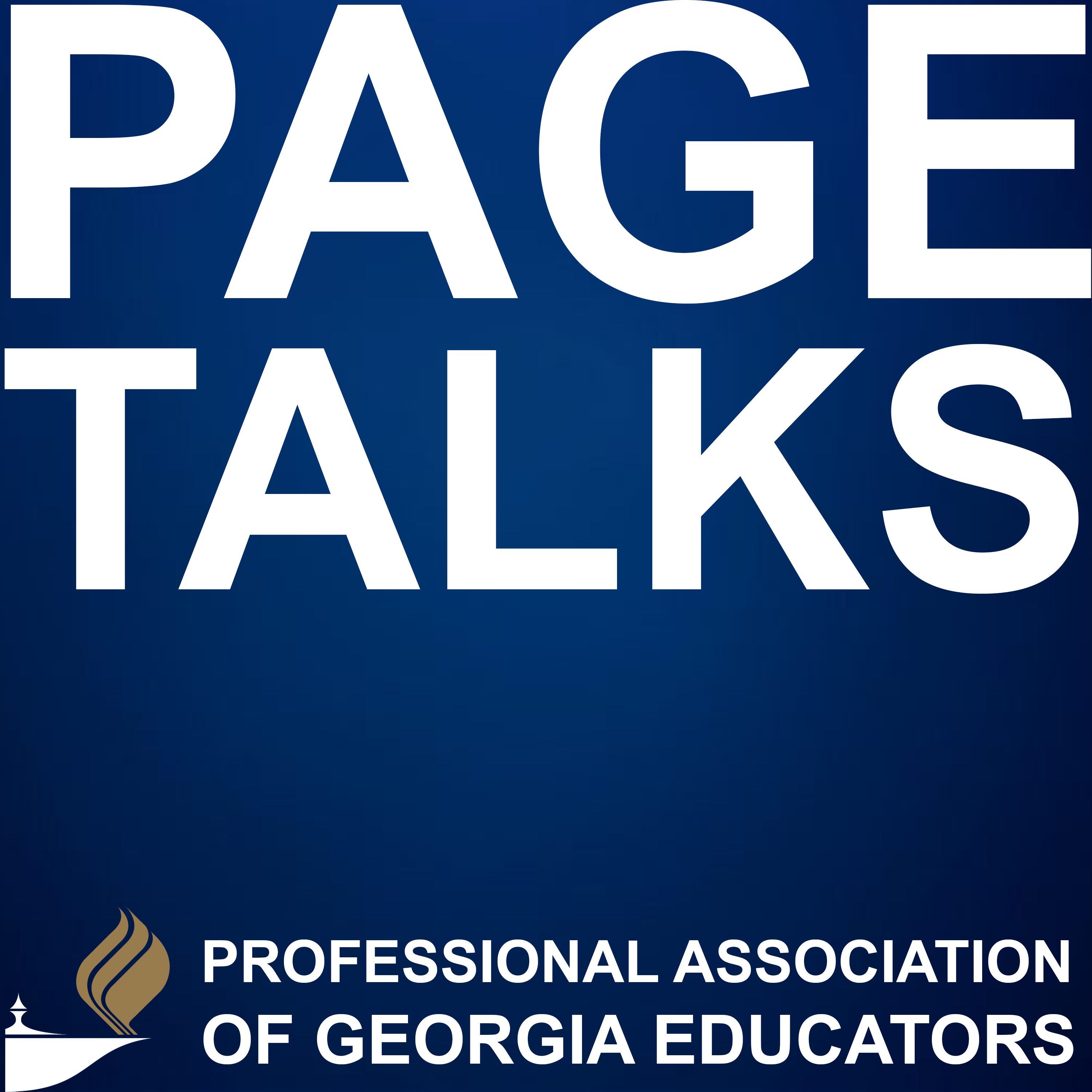Benefits-Based Accountability More Accurately Tells the Story of Schools
This episode is all about the design and implementation of benefits-based accountability for schools.
Executive Director Craig Harper hosts this conversation with John Tanner, accountability researcher, author, and founder of bravEd, and Dr. Marc Feuerbach, superintendent of Cartersville City Schools, in Cartersville, Georgia. John is the leading designer of the PAGE initiative that resulted in True Accountability for Georgia Schools (TAGS). Cartersville City Schools is one of the original pilot districts that formed TAGS and is implementing benefits-based accountability throughout the system.
Georgia school leaders interested in learning more about TAGS and how to join the initiative should contact John Tanner at john.tanner@brave-ed.com.
Music for PAGE Talks is Inspirational Outlook by Scott Holmes
Podcast cover art by Dolly Purvis with PAGE Communications
Show Notes
(Timestamped notes are summarized from comments and are not intended as a transcript)
John Tanner
03:45-Over the last five years we've gotten better at thinking about, talking about, and getting benefits-based accountability systems in place.
04:05-We can all collaborate on what accountability ought to look like in schools and figure out the best way to bring benefits-based systems into schools.
04:28-A basic benefits-based system can be in place in a few months in a school.
04:45-In the beginning of this work, it seemed like everyone needed to understand accountability in the same way and at the same depth as I did, and that was a mistake.
05:00-Where we've come in the past few years in terms of the old "Name that Tune," we've gone from naming that tune in 10 notes down to three or four.
Marc Feuerbach
05:35-To be truthful, benefits-based accountability wasn't attractive at first.
05:55-This seemed like a way to find something good to show if test scores weren't good.
06:15-This opened my eyes that this really is about the stakeholder, the community, those involved in our organization ... focusing on all areas we should be accountable for.
06:50-As we dived deeper into this, it's a more holistic approach to what we do in schools and what we're held accountable for.
John Tanner
07:40-My professional background is testing and I knew that world well. However, I was Interested in accountability, not testing and so was never obsessed about testing.
08:15-Testing is designed as a research instrument for narrow and specific purposes and not as a social decision-making tool for judgment.
09:15-Standardized testing instruments are legitimate research tools used for deeply inappropriate judgments.
09:30-There are a limited number of research functions these tests can play, and they play almost none of them. This leads in awkward and bad directions that do not share the whole truth.
10:00-It would be helpful to have better tests, but we could have the best tests in the world, and as long as we have the same accountability environment that we do, it's going to have the same effect as we have at the moment.
Marc Feuerbach
11:00-Pillars of the benefits-based accountability system described: Student Achievement; Student Readiness; Engaged, Well-Rounded Students; Community Engagement & Partnerships; Professional Learning/Quality Staff; Fiscal and Operational Systems; and, Safety and Well-being.
12:00-Only have capacity to do so much and must select areas of focus and timelines for that effort within these pillars. District and school improvement plans determine specific focus.
13:25-Bringing district, board, and school community into the process.
13:50-Test-based measurement is an easier process; benefits-based accountability involves more systems and broader involvement.
15:20-School board members get calls about much more than test scores and must address all systems of accountability, and therefore benefits-based accountability makes sense to them.
15:45-Next year, benefits-based accountability will be part of induction for new staff and then throughout the year we will have check-in points for any staff, parents, and community stakeholders who want to participate.
John Tanner
16:35-Benefits-based accountability is a much higher and more truthful accountability with greater complexity
17:00-As an example, graduation rates present a false indicator of achievement even if a school has 100 percent graduation rate.
19:00-Truth at the right level allows continuous improvement that everyone can understand from community to board to students.
19:50-"Smartness Profile" is a tool for individuals to better understand the value of schools beyond typically tested academic content.
20:50-Best way to understand the power of benefits-based accountability is to talk about Hopes and Dreams for students, which are common across all the divisions present in society.
22:30-Hopes and dreams conversations can make sure organizational priorities and stakeholders' priorities are aligned.
24:00-The formula to be a successful adult is to be really smart and passionate at a handful of things and capable in a few other things. Often the "smart" areas involve content or skills that are not narrowly focused in tested areas.
Marc Feuerbach
27:15-Not once in community discussions did someone highlight a singular desire for their children to do well on high-stakes testing. They are focused on longer-term success in broader areas of capability and interests.
28:20-How many students have we not allowed to follow their passions because we only focused on areas of weakness?
28:40-We need to find a way to bring students' passions into the work of schools to better support student growth.
John Tanner
29:15-The most remarkable learning is how incredibly empowering benefits-based accountabilities are for creating a partnership between stakeholders and organizations.
30:35-Once a partnership is built, it's impossible to stigmatize schools, neighborhoods, and communities, which is incredibly empowering and effective.
Marc Feuerbach
31:50-Cartersville City Schools is committed to this process and is learning and growing our ability to implement benefits-based accountability as the basis for continuous improvement.
Resources
Benefits-based Accountability in Schools Policy Framework
Professional Association of Georgia Educators
A Progression of Learning about Benefits-based Accountability
To better understand the progression of learning for TAGS and benefits-based accountability, listen to a John Tanner interview with David Reynolds, host of Lead. Learn. Change. - a PAGE-affiliated podcast. This episode was published January 22, 2020.

